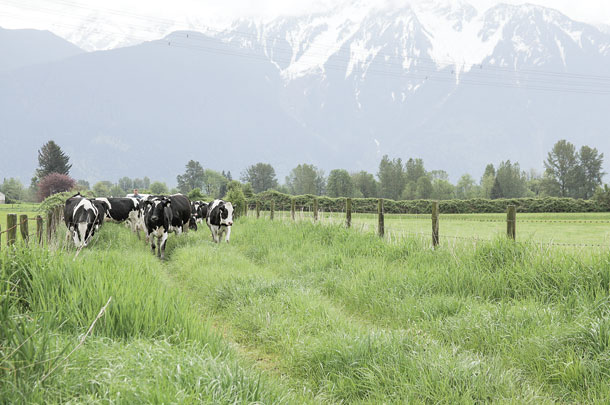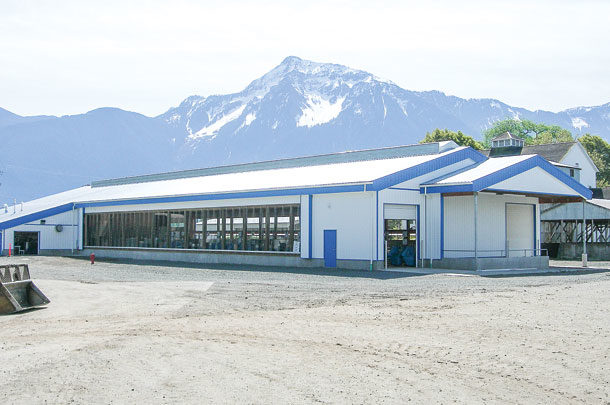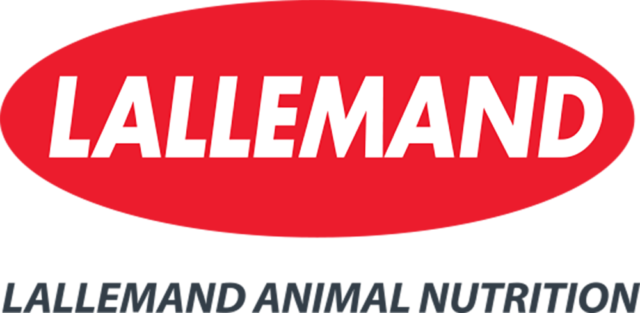The centre is a state-of-the art facility operating since 1997 and renowned worldwide for its advanced design and innovative research carried out by a strong team of dairy scientists.
Research investments have been focused on animal welfare and behaviour and reproduction. A few examples of research activities follow:
Advancing dairy cattle care practices
The industrial research chair in dairy cattle welfare at the UBC was recently renewed for another five years (2014-2019) with continued support from DFC ($50,000 per year) in addition to partner support from the Natural Sciences and Engineering Research Council (NSERC) and other dairy organizations, including Alberta Milk, B.C. Dairy Foundation, CanWest DHI, Cattle Industry Development Council, Dairy Farmers of Canada, Merck Animal Health, Natural Sciences and Engineering Council of Canada, Novus International Inc., Valacta, Westgen and Zoetis.
Led by UBC professors David Fraser, Dan Weary and Marina von Keyserlingk, this dynamic, award-winning team has dedicated their careers to creating better dairy cattle welfare and behaviour management practices in Canada to the benefit of farm operations and their animals
. The chair has contributed to developing science-based solutions to dairy cattle welfare issues including calf care, cow comfort and management, feeding behaviour, lameness and transition cow disease.
Currently, they are investigating early identification of cows at risk of becoming ill or lame – and how to create environments that reduce that risk – as well as the effects of cow and calf separation and of providing access to pasture.
Getting cows off to a strong start
Innovative research under the chair involving calf management, feeding and behaviour has gained widespread attention in the farm community and in mainstream media. It has been demonstrated that better calf management from birth leads to a better milk-producing cow later on.
 Studies, confirmed by research done at other institutions, have shown that calves benefit from receiving much higher levels of milk than were previously thought optimal.
Studies, confirmed by research done at other institutions, have shown that calves benefit from receiving much higher levels of milk than were previously thought optimal.
Instead of the standard 4 litres a day, their research shows that feeding calves 8 or more litres a day allows them to gain weight much more quickly, be healthier and ultimately produce more milk.
Rethinking how we breed cows
UBC scientist and assistant professor Dr. Ronaldo Cerri is leading an activity under the Dairy Research Cluster that focuses on rethinking how we breed cows.
Cerri and his team of seven collaborators from across Canada specializing in veterinary medicine and in animal behaviour believe that current automated technologies could be vastly improved and better utilized to collect large amounts of data for on-time decision-making at the farm level and future genetic selection.
The approach is unique and integrates areas from cow physiology to behaviour to genetics to management and economics.
In preliminary results from field trials, prioritizing detection of estrus in a reproductive program can be as effective as some current programs aiming for intensive use of timed-A.I. programs.
In addition, heifers and cows have shown a tremendous variability on their estrous behaviour with a direct correlation between estrous intensity and fertility.
Science-based measures developed to improve dairy animal care
From 2010-2014, Dr. Anne-Marie de Passillé led a team of researchers and students from Agriculture and Agri-Food Canada and from the universities of British Columbia, Calgary, Guelph and Laval to develop a tool to assess and improve the comfort of dairy animals in tiestall and freestall barns in Canada (Dairy Research Cluster).
Dairy Farmers of Canada has used the tool as the basis for the DFC-NFACC animal care assessment program, which is now part of the proAction Initiative: On-Farm Excellence.
For more on the UBC activities, see the Special Edition of the Dairy Research Update online. PD
PHOTOS: Photos provided by UBC.
Dairy Farmers of Canada (DFC) is the national policy, lobbying and promotional organization representing Canada’s farmers. DFC works to support sustainable dairy production; facilitate solutions to provincial/national challenges; provide credible research of dairy products on a national basis; and create innovative ways to grow the market.








